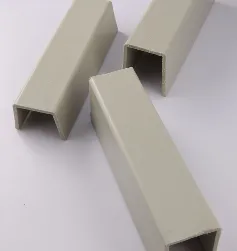فېۋرال . 19, 2025 11:48 Back to list
PP U-channel
Navigating the landscape of sustainable materials in modern production, polypropylene (PP) panels have emerged as an industrious player, revolutionizing a multitude of industries. With environmental considerations becoming paramount, these panels meet the dire demand for both durable and eco-friendly materials. Let's delve into their qualities and impacts across various sectors through an insightful lens.
Educational institutions, particularly those with a focus on design and architecture, are incorporating PP panels in their curriculum to educate budding professionals on sustainable materials. Their use in practical projects provides students with hands-on experience, fostering an understanding of material science and environmental ethics. This academic inclusion underscores the broader acceptance of PP panels in educational spheres and validates their growing importance. However, the burgeoning popularity of PP panels feeds back into a larger narrative—environmental sustainability. Polypropylene is known for being recyclable, mitigating waste concerns that have long burdened industries. As sustainability becomes a non-negotiable aspect of business models, companies are increasingly drawn to materials like PP that align with their green initiatives. Certifications and eco-labels associated with polypropylene bolster its credibility, providing businesses with the trust and authority needed in the competitive landscape. Equally noteworthy is the development of new technologies that enhance the production of PP panels, reducing energy consumption during manufacturing. This evolution reflects a remarkable synergy between industry needs and environmental consciousness, shedding light on a promising future where sustainability and efficiency co-exist harmoniously. In summary, the multifaceted applications of PP panels underscore their undeniable value across diverse sectors. The amalgamation of their physical properties, environmental benefits, and cost-efficiency marks polypropylene as a material of the future. Whether driven by a regulatory standpoint or corporate social responsibility, the comprehensive advantages presented by these panels advocate for their continued adoption and innovation. In digesting this discourse, professionals and industries alike are called to re-evaluate their material choices, underscoring a shift from conventional, resource-intensive materials to those that promise a sustainable tomorrow. As these panels pave the way, they not only answer the call for sustainability but assert a bold standard for future materials to emulate.


Educational institutions, particularly those with a focus on design and architecture, are incorporating PP panels in their curriculum to educate budding professionals on sustainable materials. Their use in practical projects provides students with hands-on experience, fostering an understanding of material science and environmental ethics. This academic inclusion underscores the broader acceptance of PP panels in educational spheres and validates their growing importance. However, the burgeoning popularity of PP panels feeds back into a larger narrative—environmental sustainability. Polypropylene is known for being recyclable, mitigating waste concerns that have long burdened industries. As sustainability becomes a non-negotiable aspect of business models, companies are increasingly drawn to materials like PP that align with their green initiatives. Certifications and eco-labels associated with polypropylene bolster its credibility, providing businesses with the trust and authority needed in the competitive landscape. Equally noteworthy is the development of new technologies that enhance the production of PP panels, reducing energy consumption during manufacturing. This evolution reflects a remarkable synergy between industry needs and environmental consciousness, shedding light on a promising future where sustainability and efficiency co-exist harmoniously. In summary, the multifaceted applications of PP panels underscore their undeniable value across diverse sectors. The amalgamation of their physical properties, environmental benefits, and cost-efficiency marks polypropylene as a material of the future. Whether driven by a regulatory standpoint or corporate social responsibility, the comprehensive advantages presented by these panels advocate for their continued adoption and innovation. In digesting this discourse, professionals and industries alike are called to re-evaluate their material choices, underscoring a shift from conventional, resource-intensive materials to those that promise a sustainable tomorrow. As these panels pave the way, they not only answer the call for sustainability but assert a bold standard for future materials to emulate.
Share:
Latest news
-
Premium PVC-M Water Supply Pipe - Durable & Efficient
NewsAug.02,2025
-
Premium PP Welding Rod: GPT-4 Turbo Enhanced
NewsAug.01,2025
-
HDPE Drainage & Irrigation Pipe - Durable, Efficient Solutions
NewsAug.01,2025
-
Premium PVC Transparent Pipe: Durable & Clear Solutions
NewsJul.31,2025
-
High-Quality UPVC Electrical Pipe for Safe Wiring Solutions
NewsJul.30,2025
-
Premium PVC Pipe Fitting Supplier – Durable & Leak-Proof Solutions
NewsJul.30,2025

